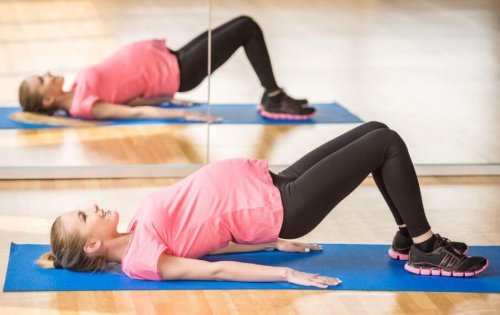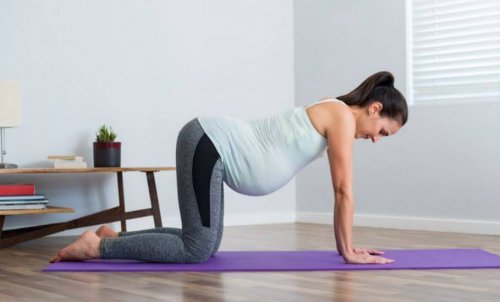Exercises During Pregnancy: do's and dont's

In most cases, doing exercises during pregnancy is beneficial for your body. However, you must talk to your doctor to find out which routine works best for you. The level of the exercises you choose will depend mainly on your physical shape before becoming pregnant.
Exercises you can do during pregnancy
The exercises you can do while you’re pregnant will depend mainly on what’s fun for you and what your doctor recommends. Swimming, for example, is a great sport, since you can float and you don’t feel the weight of your body. The best thing to do while pregnant is a combination of cardio, strength exercises and stretching, as long as you avoid exercises that involve high impact.

If you liked running before becoming pregnant, you’ll most likely be able to keep running during pregnancy, although of course, with a few changes to your routine. The first five minutes, as well as the last five minutes, you’ll want to reduce your usual pace to respectively warm up and then cool down.
Many women get dizzy during the first trimester of pregnancy and as the baby grows, their center of gravity changes. Therefore, it’s harder to maintain balance, especially in the last trimester; this also makes it harder to exercise.
Plus, if your body is telling you to stop because of unusual symptoms, you must certainly stop. Pay attention to the following. These are all signs that your body needs some rest:
- Dizziness
- Tiredness
- Difficulty breathing
- Fast heartbeat
- Pain in the back, pelvis or any related area.
Another factor you must keep in mind when exercising during pregnancy is that the temperature of your body is very important. It’s not good for the baby when your body’s temperature is higher than 39 C degrees; it can cause problems in the development of the fetus, so avoid exercising at high temperatures.
When it’s hot outside, avoid exercising outdoors during the hottest hours. Also, remember that swimming makes it difficult to know if your body temperature is increasing. This is because water will always give you a sensation of freshness.
Exercises you must avoid while pregnant
Most doctors don’t recommend exercises where you must lay on your back either, especially if you’re in the first trimester. Unless your doctor tells you otherwise, you should also avoid the following exercises during pregnancy:
- Going up and down stairs
- Exercises that involve sudden changes in the direction you’re going
- Jumping
- Exercises that may injure your abdominal area
Experts also advise against sports that involve any kind of physical contact, such as skiing, diving, and horse riding. these sports have a high risk of falling and dangerous sudden movements, which may lead to severe injury.

If you enjoy aerobic exercises, you may do step aerobics which can be incredibly beneficial during pregnancy. However, you’ll have to reduce the height of the platform, especially as the months of pregnancy progress. In addition, you must control your rhythm so that you don’t reach the point of exhaustion.
Stop the exercise and talk to your doctor immediately if you experience one of the following symptoms:
- Unusual pain
- Vaginal pain
- Faster heartbeats and strong pains in the chest
- Dizziness and lightheadedness
- Breathing difficulties
- Uterine contractions
Doing exercises during pregnancy is incredibly healthy for your body, as long as you do them correctly and carefully. Talk to your doctor to know which ones you can and can’t do.
In most cases, doing exercises during pregnancy is beneficial for your body. However, you must talk to your doctor to find out which routine works best for you. The level of the exercises you choose will depend mainly on your physical shape before becoming pregnant.
Exercises you can do during pregnancy
The exercises you can do while you’re pregnant will depend mainly on what’s fun for you and what your doctor recommends. Swimming, for example, is a great sport, since you can float and you don’t feel the weight of your body. The best thing to do while pregnant is a combination of cardio, strength exercises and stretching, as long as you avoid exercises that involve high impact.

If you liked running before becoming pregnant, you’ll most likely be able to keep running during pregnancy, although of course, with a few changes to your routine. The first five minutes, as well as the last five minutes, you’ll want to reduce your usual pace to respectively warm up and then cool down.
Many women get dizzy during the first trimester of pregnancy and as the baby grows, their center of gravity changes. Therefore, it’s harder to maintain balance, especially in the last trimester; this also makes it harder to exercise.
Plus, if your body is telling you to stop because of unusual symptoms, you must certainly stop. Pay attention to the following. These are all signs that your body needs some rest:
- Dizziness
- Tiredness
- Difficulty breathing
- Fast heartbeat
- Pain in the back, pelvis or any related area.
Another factor you must keep in mind when exercising during pregnancy is that the temperature of your body is very important. It’s not good for the baby when your body’s temperature is higher than 39 C degrees; it can cause problems in the development of the fetus, so avoid exercising at high temperatures.
When it’s hot outside, avoid exercising outdoors during the hottest hours. Also, remember that swimming makes it difficult to know if your body temperature is increasing. This is because water will always give you a sensation of freshness.
Exercises you must avoid while pregnant
Most doctors don’t recommend exercises where you must lay on your back either, especially if you’re in the first trimester. Unless your doctor tells you otherwise, you should also avoid the following exercises during pregnancy:
- Going up and down stairs
- Exercises that involve sudden changes in the direction you’re going
- Jumping
- Exercises that may injure your abdominal area
Experts also advise against sports that involve any kind of physical contact, such as skiing, diving, and horse riding. these sports have a high risk of falling and dangerous sudden movements, which may lead to severe injury.

If you enjoy aerobic exercises, you may do step aerobics which can be incredibly beneficial during pregnancy. However, you’ll have to reduce the height of the platform, especially as the months of pregnancy progress. In addition, you must control your rhythm so that you don’t reach the point of exhaustion.
Stop the exercise and talk to your doctor immediately if you experience one of the following symptoms:
- Unusual pain
- Vaginal pain
- Faster heartbeats and strong pains in the chest
- Dizziness and lightheadedness
- Breathing difficulties
- Uterine contractions
Doing exercises during pregnancy is incredibly healthy for your body, as long as you do them correctly and carefully. Talk to your doctor to know which ones you can and can’t do.
This text is provided for informational purposes only and does not replace consultation with a professional. If in doubt, consult your specialist.








